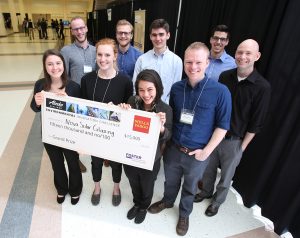Student Teams Awarded $38,000 for Environmental Innovations
On a day where being green meant everything, it was a student team highlighting the orange glow of the sun that won the spotlight. Nova Solar Glazing was awarded the $15,000 Wells Fargo grand prize at the 2017 Alaska Airlines Environmental Innovation Challenge hosted by the Foster School’s Buerk Center for Entrepreneurship. The team of electrical engineering, business, chemistry, and industrial design students from Western Washington University developed a luminescent solar concentrator glass pane. It converts current windows into energy-producing solar windows that are both affordable and practical.
“Receiving so much positive feedback from people who are working in these industries today was inspiring for us,” said Emily Bartlett, an undergraduate in Industrial Design. “They validated our ideas and encouraged us to do more. This experience showed us how many people are really out there pulling for sustainability.
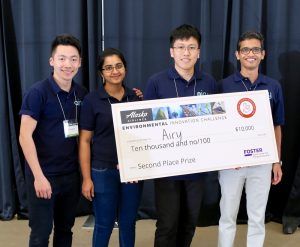 Nova Solar Glazing was one of 21 student teams looking to solve environmental and cleantech problems through innovation at the University of Washington competition. The $10,000 Herbert B. Jones Foundation second place prize went to Airy for their battery-free, wireless home security solution that uses sensors mounted on doors or windows to harvest energy. The team featured students from UW electrical engineering and business.
Nova Solar Glazing was one of 21 student teams looking to solve environmental and cleantech problems through innovation at the University of Washington competition. The $10,000 Herbert B. Jones Foundation second place prize went to Airy for their battery-free, wireless home security solution that uses sensors mounted on doors or windows to harvest energy. The team featured students from UW electrical engineering and business.
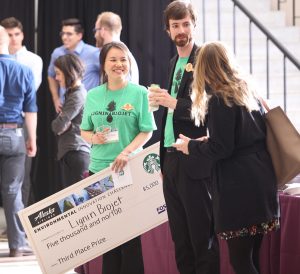 The Starbucks $5,000 third place prize was awarded to Lignin Biojet from Washington State University. The team of business and biological systems engineering students presented a technology that converts lignin, a natural polymer that’s mainly a byproduct of the paper industry, into biojet fuel to produce a renewable alternative to conventional fuel.
The Starbucks $5,000 third place prize was awarded to Lignin Biojet from Washington State University. The team of business and biological systems engineering students presented a technology that converts lignin, a natural polymer that’s mainly a byproduct of the paper industry, into biojet fuel to produce a renewable alternative to conventional fuel.
Judges awarded the $5,000 UW Clean Energy Institute clean energy prize, as well as a $1,000 “Judges Also Really Liked” award to Membrion. The team of UW chemical engineering and MBA students is an example of a growing trend in student entrepreneurship where an idea is “under production” for several years, validated, and submitted into competitions each year the students are eligible to compete.
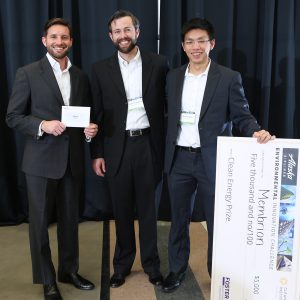 Two other $1,000 “Judges Also Really Liked” awards were handed out to GreenFeed, which developed a way to convert retail food waste into a sustainable, scientifically-formulated fish feed for the agriculture industry, and UW Hyperloop, which is developing a sustainable form of accelerated public transportation that will cut travel times, congestion, and greenhouse gas emissions. “There are a 170 judges in this room, including myself, who walk away inspired by these students,” said Alaska Airlines sustainability manager Jacqueline Drumheller at the event. “We’re really counting on you as innovators—giving us a sneak peek at our collective future—by showing us the creative things you can do to solve the world’s problems.”
Two other $1,000 “Judges Also Really Liked” awards were handed out to GreenFeed, which developed a way to convert retail food waste into a sustainable, scientifically-formulated fish feed for the agriculture industry, and UW Hyperloop, which is developing a sustainable form of accelerated public transportation that will cut travel times, congestion, and greenhouse gas emissions. “There are a 170 judges in this room, including myself, who walk away inspired by these students,” said Alaska Airlines sustainability manager Jacqueline Drumheller at the event. “We’re really counting on you as innovators—giving us a sneak peek at our collective future—by showing us the creative things you can do to solve the world’s problems.”
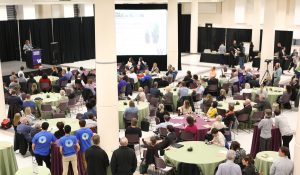 Daniel Schwartz, director of the UW Clean Energy Institute, was among the other sponsor representatives who felt inspired by the student innovations on display. “We are so proud to be a part of an event that pushes environmental ideas out to the world.”
Daniel Schwartz, director of the UW Clean Energy Institute, was among the other sponsor representatives who felt inspired by the student innovations on display. “We are so proud to be a part of an event that pushes environmental ideas out to the world.”
The Buerk Center would like to thank the other EIC sponsors including the Foster School of Business, the UW College of Engineering, WRF Capital, the UW College of Built Environments, UW CoMotion, the UW College of the Environment, Cairncross & Hempelmann, Perkins Coie Foundation, Puget Sound Energy, Christensen O’Connor Johnson Kindness, McKinstry, the UW Department of Biology, Amazon Catalyst, and Element 8.

